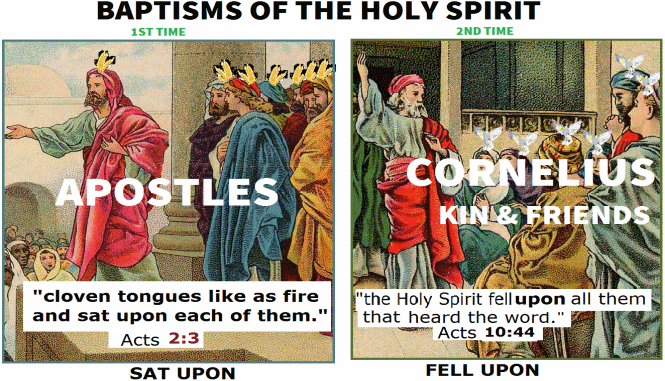
Question: Who are the “we” of Acts 10:47?
Peter calls what happened to Cornelius, his kin, and friends “the baptism of the Holy Spirit” (Acts 11:15) but says it’s the same as what “we” received.
|
My Answer:
First of all, I recommend for your reading my other articles on the gift of the Holy Spirit on this website:
The “WE” of Acts 10:47 Background: Peter and company in the Gentile Cornelius’ home with his friends. The audience has just been baptized with the Holy Spirit. KJV: “Can any man forbid water, that these should not be baptized, which have received the Holy Ghost as well as we?” “receivedG2983 asG2531 alsoG2532 we?G1473” ελαβονG2983 ωςG5613 ADV καιG2532 CONJ ημειςG1473 (Westcott-Hort’s Greek)
The question is, ‘Who is Peter calling “we” in the text?’ Peter compares the the baptism of the Holy Spirit upon the Gentile audience with another occurrence that included the ones designated as “we”? Who is the “we” that’s referred to?
“WE” is personal nominative plural pronoun. The following observation is interesting: the specific Greek word for the “we” used in the Greek text (is only used [added*] when it’s emphatic) -- “us, we (ourselves)!” * Greek endings usually is sufficient without this word. The Bible is misinterpreted many times simply by one jumping to conclusions about the interpretations of the antecedents of pronouns. Jesus’ comments during the Last Supper is so misused many times; e.g., Jesus is the Vine and the apostles are the branches (not future denominations, etc.), John 14-17. “Usually it is no big deal to find an antecedent. Start looking for a word with the same number and gender as the pronoun. But every once in a while, the antecedent can be a little elusive.”i On the surface there are several possibilities in our text. When Peter says “we”, he is speaking of either (1) himself and the Jewish individuals with him or (2) his close company [apostles, Acts 4:23] or the Jewish nation whom Peter might think of himself as representing in contrast to Gentile nations. M. Stanley Whitley of West Virginia University writes the pronouns “we, you, and they, have a far more complex make-up and students of English speech must either be content with erratic deviations …”ii He gives the following sentences to illustrate: “Just think! In the twenty-third century we’ll teleport to Mars in just seconds. When my great-grandad was a boy, you could still buy candy for a penny a stick.” The “we” and the “you” are not the current speaker nor the one addressed. Pertinent facts must be respected and so used in interpretations.
Peter rehearses the scene later to those in Jerusalem: “(ASV) And when Peter was come up to Jerusalem, they that were of the circumcision contended with him” (Acts 11:2). He rehearses at his arrival at the Gentile home about his purpose, “Who shall tell thee words, whereby thou and all thy house shall be saved. And as I began to speak, the Holy Ghost fell on them, as on us* at the beginning. Then remembered I the word of the Lord, how that he said, John indeed baptized with water; but ye shall be baptized with the Holy Ghost” (Acts 11:14-16; note, Jesus in Acts 1 told the apostles they would be baptized with the Holy Spirit and they were as recorded in Acts 2:1-4).
a. Meyer's NT Commentary: Meyer connects the “we” to the “we” expressed by Peter at Jerusalem in the following chapter (11:15) and refers it to Pentecost. “‘καθὼς καὶ (and) ἡμεῖς] as also we, the recipients of the Spirit of Pentecost. This refers to the prominent and peculiar character of the enraptured speaking, by which the fact then occurring showed itself as of a similar kind to that which happened on Pentecost (Acts 11:15).” - from Meyer's NT Commentary
b. Barnes’ Notes on the Bible: The “we” = “nation of Jews” on the day of Pentecost who witnessed the baptism of the Holy Spirit upon the apostles. God has manifested Himself to them [small group of Jews] in Acts 10 as he did to all the Jews on the day of Pentecost. Hence, Barnes is suggesting, I understand, that “we” would refer to the witnesses of the manifestation of the Spirit baptism on Pentecost. Would this not include also the spectators who did not receive or believe but observed the apostolic baptism of the Spirit? But Peter says the “we” received the Spirit, did he not? The record in Acts 2 is specific about who was speaking in the tongues to the amazement of all. The apostles were the only ones who received this “like” baptism of the Spirit. - GW - Barnes’ Notes on the Bible
c. Gill's Exposition of the Entire Bible : Gill agrees that the receipt of the Spirit that Peter is acknowledging is “the extraordinary gifts [sic] of the Spirit” [My comment: it doesn’t say plural gifts but singular gift (10: 45.] However, Gill comments that receiving the Holy Spirit can in other instances also mean receiving the “spirit of illumination and conviction, as a spirit of regeneration, sanctification, and conversion, and as a spirit of faith and adoption, and as a witness, earnest.” - Gill's Exposition of the Entire Bible My comment here is that the Gentiles had to hear Peter’s complete message from the Spirit in order to receive the “spirit of illumination, conviction, regeneration, faith, etc.” Yet, after their baptism of the Holy Spirit, Peter continued and finished his sermon that offered such blessings. “While Peter yet spake these words, the Holy Ghost fell” (Acts 10:34-43). Peter says it was at the beginning which would be before the message was heard: “After I started speaking, the Holy Spirit was given to them” (11:15, CEV); “started” archomaiG756: “commencement, beginning.”
2. The true identification and, hence, interpretation of the “we” cannot contradict the recorded facts of the first baptism of the Holy Spirit occurrence. a. The baptism was promised to the apostles (Acts 1:2). Power was to accompany its occurrence (Acts 1:5 & 8). The 12 apostles were gathered together (Acts 1:26; 2:1) and the pouring out of the Holy Spirit occurred upon them (2:3,4). The people was attracted by the sound to where the apostles were (Acts 2:6). The apostles were accused by some of being drunk (Acts 2:13). The audience listened to Peter who was standing with the eleven (2:14). b. There is no other baptism of the Holy Spirit upon anyone from Acts 2 until one gets to Acts 10. Even the Samaritans (Acts 8) had the laying on of the apostles’ hands to receive the Holy Spirit’s power. c. The “baptism of the Holy Spirit” is identified only twice: Pentecost with the Jews and the gathering of the Gentiles of Acts 10 and 11.
My conclusion is that the “we” of Acts 10:15 can be the same as the “we” at the beginning (Acts 11) which would be the apostles. The following could also be true without contradicting other passages: Peter may have had in mind that just as the Jewish nation had been offered the “ordinary inward gift” of the Spirit (through the Saving Word) demonstrated by the first Spirit baptism upon the apostles, the same saving gospel was now being demonstrated as being offered to the Gentiles and confirmed by the second baptism of the Spirit.
ihttps://www.billmounce.com/monday-with-mounce/where-o-where-did-the-antecedent-go-phil-1-19 iihttps://www.jstor.org/stable/455337?seq=1#page_scan_tab_contents |

